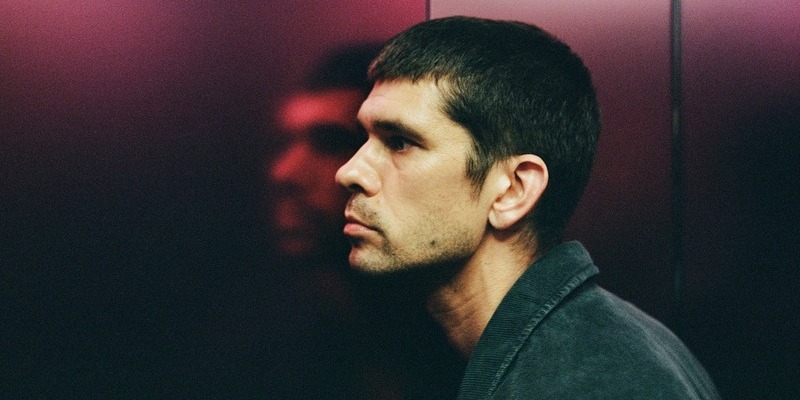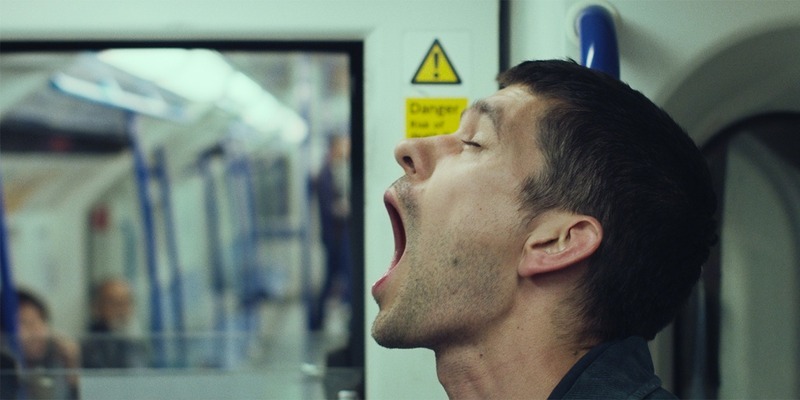
Review by
Eric Hillis
Directed by: Aneil Karia
Starring: Ben Whishaw, Ellie Haddington, Ian Gelder, Jasmine Jobson

Director Aneil Karia gained attention for his 2013 short
Beat, in which Ben Whishaw played a man dancing manically through the
generally oblivious but sometimes confrontational streets of London. For
his feature debut, Surge, Karia has reenlisted Whishaw for a film that similarly drops the actor
into crowded London streets where he behaves like the sort of person you
make sure to avoid eye contact with, gesturing to the sky and muttering to
himself.
How do such people end up this way? Well, in the case of Joseph (Whishaw),
it's the result of a Falling Down-esque breakdown. Working in security at Stansted Airport, Joseph's days
are filled with stressful encounters with the public. In the evening he
goes home to his apartment, microwaves his dinner and listens to an
obnoxious neighbour constantly revving his quad bike.

During an awkward birthday party thrown by his judgmental parents, Joseph
finally snaps, biting into a glass tumbler and cutting his lip before
fleeing his childhood home. The next day in work he similarly flips out
and is summarily dismissed. Joseph decides he doesn't give a damn anymore,
and to hell with the consequences. Armed with this liberating state of
mind he holds up a bank, merely using a note that claims he has a gun
trained on the cashier, and is surprised at how easily he gets away with
it.
In a style heavily influenced by Alan Clarke, Karia follows Joseph over
the next 24 hours as he visits Lily (Jasmine Jobson), the co-worker
he's long harboured a crush on, steals his neighbour's quad bike, checks
into and trashes a hotel room, crashes a wedding reception, and robs
another couple of banks. And when I say follow, I mean follow - as in
Clarke's Elephant (and Gus Van Sant's Clarke-ian drama of
the same name), the camera hovers behind Joseph as though he's the
protagonist of a Grand Theft Auto video game.

Whishaw is arguably best known for providing the voice of Paddington,
whose motto is "If we're kind and polite the world will be right." As
well-intentioned such an idea is, there's little real world evidence to
back it up. Joseph spends his days being courteous to the public and it
just leads him down a path of depression. It's only when he decides to
embrace a solipsistic mentality that he finds joy, albeit for a brief
period of time. Much of this is of his own making, like his obsession with
Lily, who willingly engages in a quickie within minutes of him popping
around armed with his new narcissistic state of mind. Having built her up
as some sort of unattainable goddess in his mind, Joseph can only laugh
when he realises how easily she gives herself to him for some meaningless
pawing.
Joseph appears to have spent most of his life torturing himself with his
low self-esteem, but Surge argues the case that this sort of
self-awareness, while damaging to our mental health, can prevent us from
reverting to a Neanderthal mentality; that being "civilised" is grounded
in fear of consequences; that we're just a mere sensory overload from our
lizard brain kicking in and causing us to follow our most primal
instincts.

That Karia has chosen Whishaw - an actor known for a very British
restraint - to embody the madness that threatens to rise up in all of us
is a clever move. All flailing, sinewy limbs and manic piercing eyes,
Whishaw is almost unrecognisable in arguably a career best performance.
With little in the way of dialogue, it's a physical part that's as much
dance as acting, mentality conveyed through movement as Whishaw dances
through the oblivious crowds like a jester who showed up for work at the
wrong court. If Paddington himself can lose his way, what hope for the
rest of us?

Surge is on Prime Video UK now.
